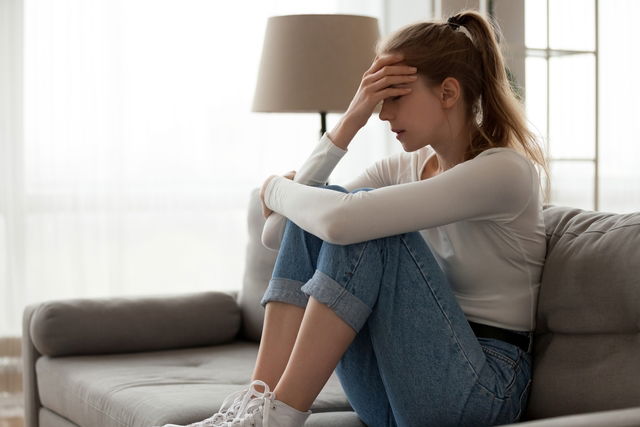Stress and anxiety are terms that are commonly used to refer to the same situations, however they can be differentiated by their signs and symptoms.
Stress is usually related to any situation or thought that triggers frustration and nervousness. It tends to resolve on its own, spontaneously. Anxiety, on the other hand, is related to irrational fear, affliction and excessive worrying due to a feeling of insecurity and indecisiveness. It commonly presents with other psychiatric disorders, like depression.
Although they are caused by different factors, stress and anxiety can still present with similar symptoms, like increased heart rate, dry mouth, sleep changes and difficulty concentrating. However symptoms of stress tend to be temporary, while anxiety tends to last for days to weeks.

Difference between stress and anxiety symptoms
Stress and anxiety can lead to physical and psychological symptoms. However, stress symptoms tend to resolve within a few hours, when the triggering factor is eliminated. Anxiety tends to linger, even if the trigger that caused the original symptoms has been eliminated.
The main symptoms of stress and anxiety are:
With anxiety specifically, other psychological symptoms can emerge like:
- Excessive worrying
- Constant fear
- Feeling that something bad will happen
- Loss of control over your own thoughts
Anxiety symptoms usually emerge when you have to expose yourself to others, like at work presentations or meetings. The symptoms can appear a few days before the triggering situation, due to excessive worrying about what others think and imagining different scenarios that can happen as a result.
On the other hand, symptoms of stress can emerge from situations that are already part of your routine, like pressure at work, traffic, and insufficient time spent with family and friends.
Possible consequences of stress vs anxiety
Because stress and anxiety can cause both physical and psychological symptoms, it is possible to notice changes to the way your body works, particularly during periods of stress and anxiety. Some consequences include:
- Gastrointestinal changes, like diarrhea or constipation
- Intestinal inflammation, which can increase the risk fori irritable bowel syndrome
- Weight gain and increased abdominal fat, which can also lead to abnormal cholesterol levels, triglyceride levels and high blood pressure. These factors can increase your risk for metabolic syndrome
- Stomach ulcers, due to increased stomach acid production.
- Gastritis, which is related to chronic inflammation along the stomach wall, caused by chronic stress.
- Reduced immune function, which can increase your risk for infectious diseases.
In some cases, mainly when stress and anxiety are chronic, it is also possible to notice weaker, more fragile nails, as well as dry skin and hair loss.
How to relieve symptoms
To relieve symptoms of stress and anxiety and to prevent new flare-ups, you should adopt relaxation techniques and try to promote your wellbeing. Some activities include exercising, meditation, breathing exercises and soothing teas (like chamomile, valerian and lemongrass teas). Check out other herbs for anxiety and stress that you can use to prepare relaxing teas.
Stress and anxiety that are are frequent or present with symptoms that do not resolve with simple measures should be assessed by a family doctor or psychologist. The doctor can help you to identify the factors that are triggering symptoms and facilitate coping mechanisms to help you deal with them. In some cases, the doctor may refer you to a psychiatrist to assess the need for medications, like alprazolam or diazepam. Learn more about anxiety medications that your doctor may consider to help you manage your symptoms.
